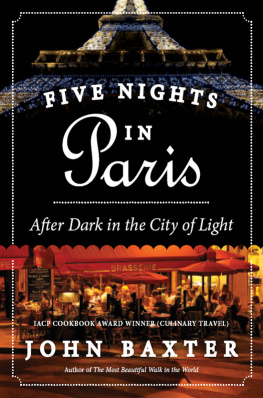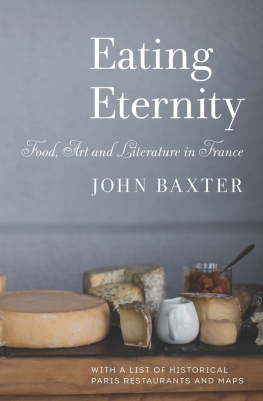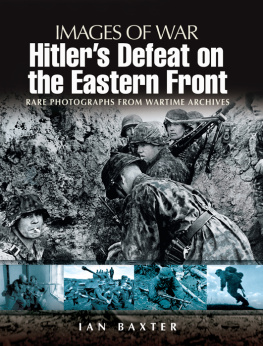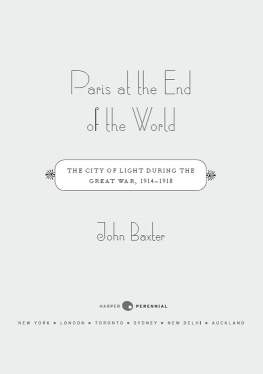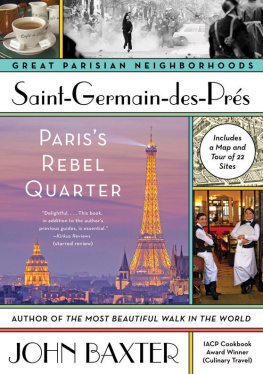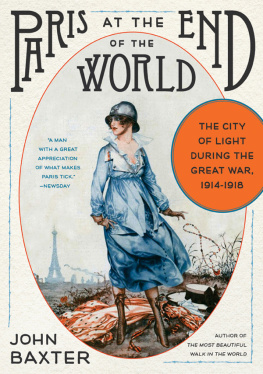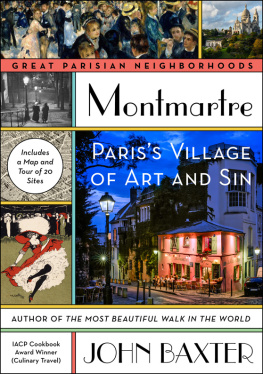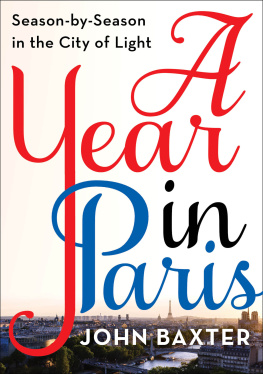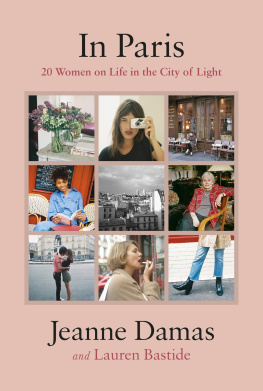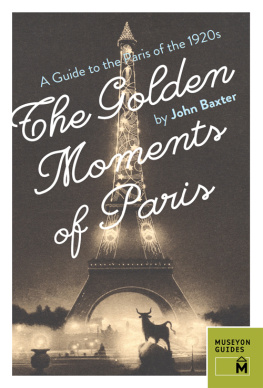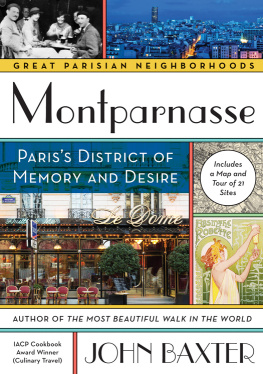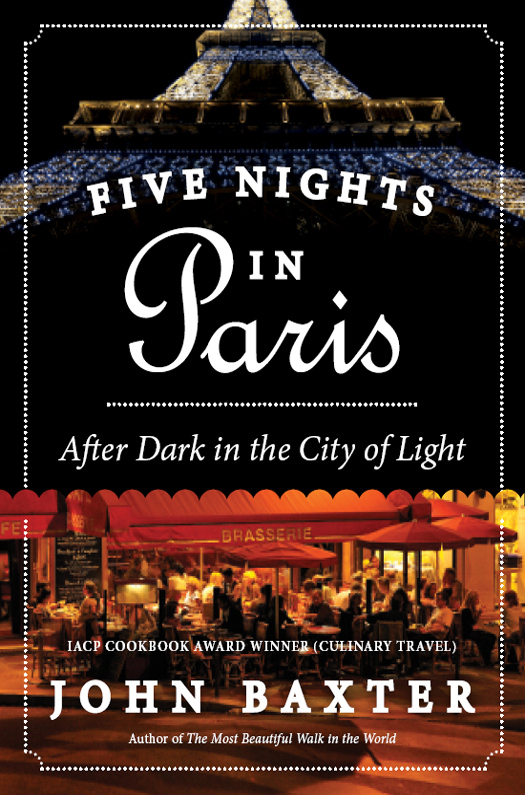Contents
Guide
For Marie-Dominique and Louise
Il ny a quun bonheur dans la vie,
cest daimer et dtre aim.
And the night shall be filled with music,
And the cares that infest the day
Will fold their tents, like the Arabs,
And as silently steal away.
HENRY WADSWORTH LONGFELLOW, The Day Is Done
His words were shapely, even as his lips,
And courtesy he used like any lord.
Was it through books that you first thought of ships?
Reading a book, sir, made me go abroad.
WILFRED OWEN, It Was a Navy Boy
L ong before I decided to leave Australia, in the 1960s, I felt the desire to escape. Year by year, it crept over me like a thrilling sickness.
Some footloose friends also wanted to go abroad, but their horizons extended only to such tropical paradises as Bali. I set my sights on England and, in time, California.
Three factors forced the final break. Two were TV commercials. International airlines had just identified Australia as a rich new market and were upping their promotional efforts.
The first, for Pan Am, began with a telephoto lens peering down a runway. At the far end was a Boeing, lumbering toward us as it built up speed for the takeoff.
At this moment, murmured an insinuatingly seductive voice, in New York, the lights are going on along Broadway. Meanwhile, in London... , and so on, through capsule evocations of Tokyo, Buenos Aires, Paris.
By then, the Boeing was swelling to fill the screen. In this world, concluded the voice, there are many places to go; many cities to see. And just as the plane roared overhead, came the clincher. Now is the time, it said. Now, when the heart says Go!
The second commercial, created by BOAC, later British Airways, was, by contrast, seductively soft-sell. For commentary, it offered simply a reading of John of Gaunts anthem for England from Shakespeares Richard II.
This royal throne of kings, this sceptered isle,
This earth of majesty, this seat of Mars
No roaring jet liners for the Brits; just scenes of villages, cities, lakes, woods, and fields, endinga brilliant touchwith a man on a bicycle wobbling away down a leafy lane to this earth, this realm, this England.
But I said there were three inspirationsand the third, perhaps the clincher, was nothing like the other two.
My wife of the time had a girlfriend from school. Shed recently married, so we invited the couple around for dinner. As my wife explained before they arrived, Annie had always been the wild one: the first to smoke, the first to play hooky, the first to lose her virginity.
In person, she certainly filled the eye: a little too much cleavage, perfume a bit overpowering, more hair than one was used to seeing in conservative Sydney. But undeniably a dish.
Her husband, Rob, was quieter. Big, casual, confident, soft-spoken; Robert Mitchum, I thought. He never quite said what he did for a living, but obviously it paid well. And hed traveled to all the places I wanted to see.
Over dinner, I quizzed him mercilessly. What was New York really like? Had he been to Tokyo? London must be wonderful. And Paris?
Ive spent time there, he acknowledged.
I pressed for details. Where did he stay? What places did he visit? Notre Dame? The Louvre?
For instance, I concluded, last time you were in Paris, what was the first thing you did?
He and Annie exchanged a look of collusion, one of those Shall we tell them? glances, with a half-grin, that often precede revelations.
Well, said Rob, if you really want to know, I knocked off the Patek Philippe watch exhibition.
I blinked. Knocked off... ?
John, mate, he grinned, Im a thief.
And he was. A very good one, as it happensthe leader of a crew of shoplifters that targeted high-end stores all over the world. For the next few hours, he explained and demonstrated some tricks of his trade: the techniques of distraction and misdirection, the elements of performance, the art of it. The well-brought-up, law-abiding Catholic boy in me deprecated his way of life, but the larger partthe adventurer-in-waiting, the reader of crime fiction, the admirer of film noirwas seduced. After that, it was only a matter of time.
I dare say, moreover, she pursued with an interested gravity, that I do, that we all do here, run too much to mere eye. But how can it be helped? Were all looking at each otherand in the light of Paris one sees what things resemble. Thats what the light of Paris seems always to show. Its the fault of the light of Parisdear old light!
HENRY JAMES, The Ambassadors
S ome years ago, as a change from spending all my time writing, I began taking people on literary walks. It started by chance, when someone hired to lead such a walk for the Paris Writers Workshop, of which I was codirector, didnt seem up to the task. To my surprise, I found I enjoyed it. However, a certain chill on the part of fellow writers made it clear they didnt approve. Apparently it Simply Wasnt Done. This just made me more determined.
Not only did it turn out to be great fun, and an opportunity to meet interesting people. It was also educational. I thought I knew my adoptive city pretty well. As it turned out, I was woefully ignorant.
My greatest problem proved to be where to take my clients. It wasnt that there was too little to showrather, there was too much.
Asked how many expatriates worked in the arts in Montparnasse during the 1920s, writer and editor Robert McAlmon estimated 250. Not so many, perhapsexcept that most lived within a mile of our apartment. Keeping track of these people and giving each of them a voice can be like trying to follow a single conversation in the din of a noisy party.
The period we call les annes follesthe crazy yearsis a blur of cocktails, jazz, and talk. Most memoirs of the period were written thirty years after the event, and often set out to settle old scores rather than provide an accurate record. Documentation is skimpy. Tape recorders werent invented, and the only people taking notes were journalists, who felt free to improvise and invent. Facts and dates were of little account to them. Was Cole Porter actually in Paris in 1928 when he wrote the musical Paris? And did F. Scott Fitzgerald publish The Great Gatsby before or after he met Ernest Hemingway? With a deadline looming and too little time for research, it was easier to invent.
If chronicling the famous is difficult, how much more so those who never fulfilled their promise? Who today remembers Harold Stearns, George Davis, Hilda Doolittle, Glenway Wescott, Kay Boyle, Walter Berry, Mina Loy, Morley Callaghan, Elliot Paul, Harry Crosby? Yet all have voices just as loud as Hemingway or Stein. Once you add the other communities, such as the Spanish (Picasso painted Guernica a few blocks from our apartment), German (Wagner lived almost as close), Russian (Lenin drank at the Le Dme caf, on the other side of the Luxembourg Gardens), even the Australians (an Aussie painter named Agnes Goodsir actually lived in our apartment from 1919 to 1939), the conversations rise to a cacophony.

